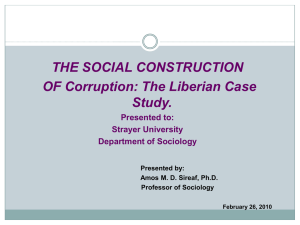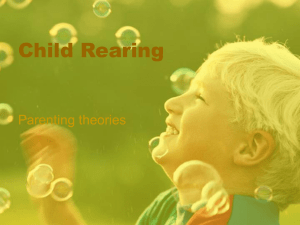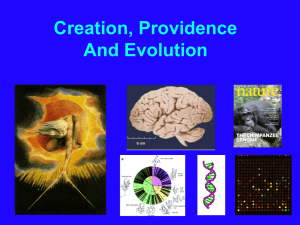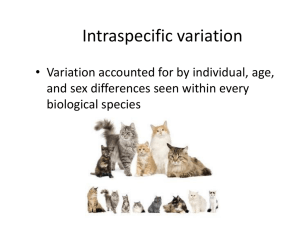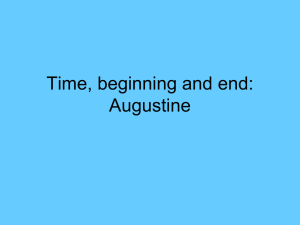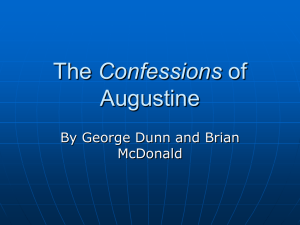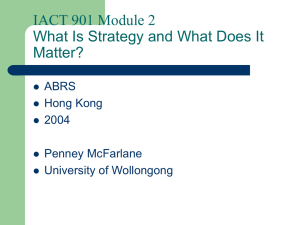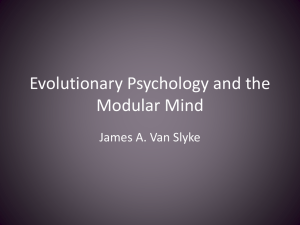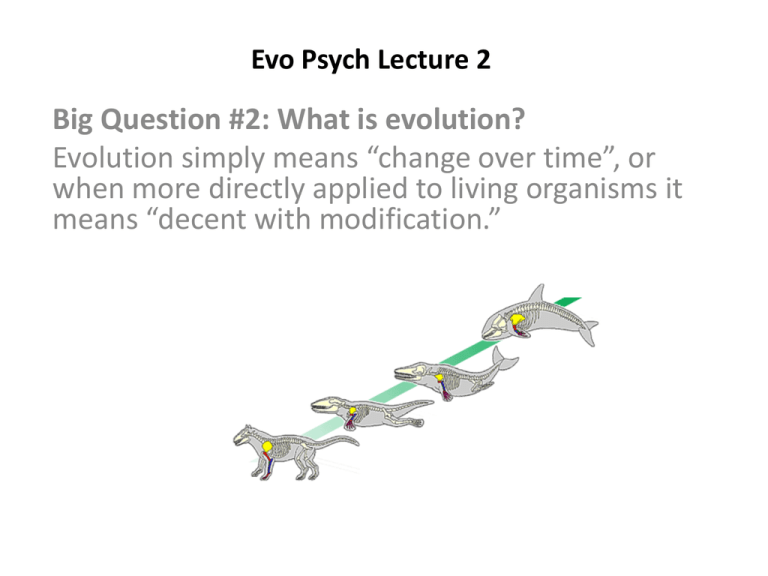
Evo Psych Lecture 2
Big Question #2: What is evolution?
Evolution simply means “change over time”, or
when more directly applied to living organisms it
means “decent with modification.”
• Big Question #3: Where did
the idea of evolution come
from?
Evolutionary ideas have been
around for millennia
• Anaximander, Greek
philosopher (c. 610 BC – c.
546 BC) “in water the first
animal arose covered with
spiny skin and with the lapse
of time some crawled onto
dry land…” On Nature
Evolutionary ideas: Pre-Darwin
Augustine of Hippo (St. Augustine 354-430
CE)
“In the beginning were created only germs
or causes of the forms of life which were
afterwards to be developed in gradual
course”
St. Augustine from De Genesi ad Litteram
(Literal meaning of Genesis)
Rationes Seminales: Seminal reasons,
seminal ideas, originating principles.
Presumed to have been implanted in
organisms in seedlike form at the
moment of creation. Some things were
not created “fully formed” but were
created more as seeds with the forms
imprinted in them. Over time the seed is
allowed to unfold, following the plan to it
final form
Rationes Seminales
What’s evolutionary about it?
Does allow for gradual change over time, with sometimes dramatic
transformation taking place. Such as acorn transforming into oak tree.
Furthermore, these transformations follow the laws of nature and require no
divine intervention once the process has begun. De Genesi ad Litteram 9:17
(Augustine’s discussion of the regularity of natural laws)
What’s not evolutionary about it?
Augustine adhered to the Aristotelian notion of fixity of species. Thus,
the rationes seminales did not allow for the creation of new species, a
central element of modern evolutionary theory. However, in his
adherence to the notion of fixity of species Augustine was simply
reflecting the state of knowledge of his day. De Genesi ad Litteram 9:17
Evolutionary Ideas: Pre-Darwin
Thomas Aquinas 1225-1274
Adhered to Aristotelian fixity of species
Introduced a strong element of naturalism is
the understanding of human nature.
Asserting that
• The human body is composed of the same
elements of as other “inferior” creatures,
thus sharing a material continuity with
other organisms of the earth (ST P1 Q91
A1)
• Man is unquestionably categorized as an
“animal” -- “man and ass are both in the
genus animal” (from De principiis naturae,
On the principles of nature).
Aquinas continued
• The human soul (or mind) is intimately connected to the body and the
material state of the body affects the function of the soul or mind
“because some men have bodies of better disposition, their souls have
greater power of understanding” a strongly anti-dualist position contra
Decartes (ST P1 Q85 A7)
• Marriage is a natural to humans and based on parental investment.
Aquinas observes that in creatures where rearing of the young does not
require provisioning by the male, the male leaves immediately after the
sex act. In animals where provisioning is necessary males remain with the
female for the purpose of rearing the young. As is true with birds, so it is
with man. It is natural for man to remain with one woman for a long time,
rather that short for the raising of children. (SCG B3 A122)
• He further asserts that marriage is natural to man for purposes of
ensuring paternity certainty (SCG B3 A123)
• He argues against incest and polygamy not from divine law, but natural
law arguing that incest goes contrary to man’s natural inclination to widen
the circle of friendships in human society, and polygamy causes discord
within the household , i.e. resource competition (SCG B3 A124-125).
Thomas Aquinas on Marriage
• We observe that in those animals, dogs for
instance, in which the female herself suffices for the
rearing of the offspring, the male and female stay
no time together after the sexual act. But in animals
in which the female herself does not suffice for the
rearing of the offspring, male and female dwell
together after the sexual act so long as is necessary
for the rearing and training of the offspring. This
appears in birds whose young are incapable of their
own food after they are hatched…Hence, whereas it
is necessary in all animals for the male to stand by
the female for such a time as the father’s
concurrence is requisite for bringing up the
progeny, it is natural for man to be tied to…one
woman for a long period…(SCG B3 Q122).
©John Wiley & Sons, Inc. 2007
Huffman: Psychology in Action (8e)
Evolutionary Ideas: Pre-Darwin
• Georges de Buffon 1707-1788
French naturalist, mathematician,
cosmologist
In his Histoire naturelle discusses
a concept similar to “common
descent.” However, did not see
a close relationship between
humans and apes. Credited by
Darwin as being the first
modern author to treat
evolution in a scientific spirit.
Darwinism
• Charles Darwin’s major
contribution was not
evolution itself; but the
mechanism by which it
operated: Natural
selection
• NS was also discussed by
Darwin’s contemporary:
Alfred Russel Wallace
Evolution: Basic Principles
Evolution: Change over time; decent with modification
Natural Selection: Primary mechanism producing
evolution (change over time). There are other
mechanisms such as: sexual selection, social
selection, drift.
Basic principles of NS:
1.
Variability: stuff varies
2.
Heritability: variation is passed on genetically
3.
Competition: limited resources
4.
Selection: some variations are advantageous in
securing limited resources and tend to passed on
more than others = change over time
Spencer’s misleading summary of NS: “survival of the
fittest.”
History of Evolutionary Psychology
Emergence of Psychology as science: 1879
Wilhelm Wundt’s Structuralism
William James: Functionalism
John Watson: Behaviorism
Only James saw evolution as relevant
Behaviorism (equipotentiality vs. prepared learning)
European Ethology
Study of animal behavior
Niko Tinbergen; Konrad Lorenz; Karl Von Frisch
Relevance of evolution, important concepts
Kinship; altruism; imitation; aggression; functional
and adaptive significance of behavior
E. O. Wilson and Sociobiology
• In 1975 Harvard biologist E.
O. Wilson published
Sociobiology
• Integrating evolution into
the study of animal
behavior, especially social
behavior
• Proposed extending the
study to human behavior
• Controversial – genetic
determinism
Evo Psych and Sociobio
• Tooby and Cosmides
Adapted Mind, 1992
(mental modules for
solving past adaptive
problems)
• David Buss: Mating
Universals


